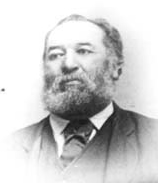Charles Nolin facts for kids
Quick facts for kids
Charles Nolin
|
|
|---|---|
 |
|
| Legislative Assembly of the Northwest Territories | |
| In office 1891–1892 |
|
| Personal details | |
| Born | 2 May 1838 Saint Boniface, Rupert's Land |
| Died | 28 January 1907 (aged 68) Battleford, Saskatchewan, Canada |
| Spouses |
|
| Children | 20 |
Charles Nolin (born March 2, 1838 – died January 28, 1907) was a Métis farmer and a political leader. He is known for his part in the North-West Resistance of 1885. He was educated by a bishop and later worked as a fur trader and merchant. Nolin was born in 1838 in Saint Boniface. He passed away on January 28, 1907, in Battleford.
Contents
What Was the North-West Resistance?
The Métis people felt they weren't being heard by the government of the Northwest Territories. They sent many requests, but nothing seemed to change. This led to the start of the North-West Resistance in 1885.
In 1884, Charles Nolin and Maxime Lépine helped create a group of Métis people. This group wanted their rights to be recognized by the government. Nolin was also a first cousin to Louis Riel, a very important Métis leader.
Nolin first joined Riel's Council in Batoche during the resistance. However, he later disagreed with Riel about using weapons to solve their problems with the Canadian government. His views changed after Riel had disagreements with the Catholic Church leaders.
Charles Nolin's Trial in 1885
During the North-West Resistance, Charles Nolin and William Boyer were put on trial. They were accused of acting against the Métis cause by the Provisional government's Council.
However, Nolin and Boyer promised to support the cause. Because of this, they were found not guilty. Even though Nolin was Riel's cousin, he spoke against Riel at his trial. What Nolin said during the trial is believed to have played a part in Riel's punishment. Nolin had also disagreed with Riel in 1870.
Charles Nolin's Political Career
After the North-West Resistance, Nolin continued his political work. He was elected to represent Batoche in the Northwest Territories. This happened in the 1891 election for the Legislative Assembly.
He actively supported the Canadian government. However, he was forced to leave his position a year later by a court order.
See also
 | Misty Copeland |
 | Raven Wilkinson |
 | Debra Austin |
 | Aesha Ash |

